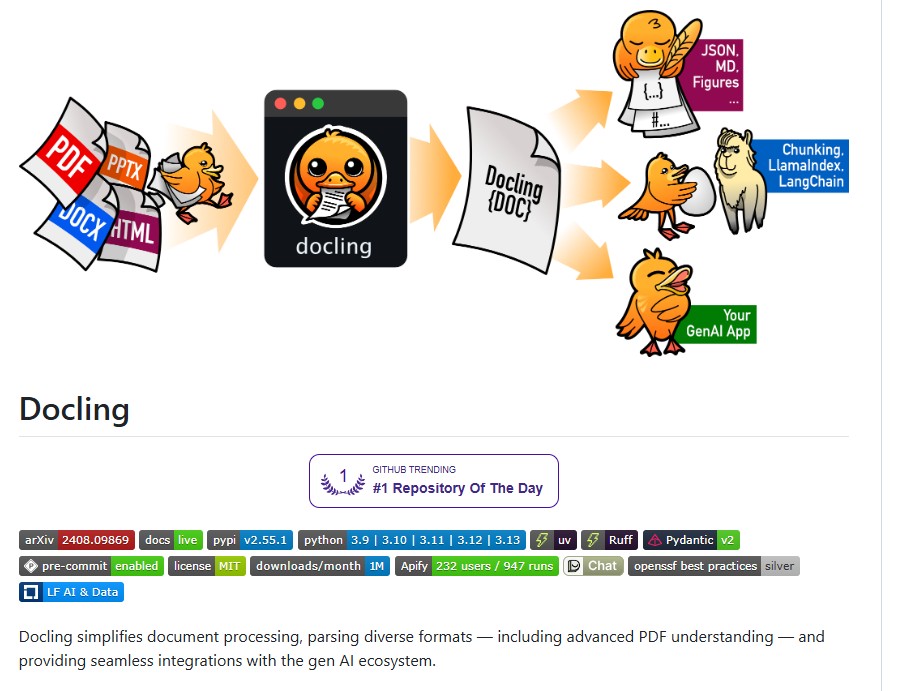In today’s AI-driven world, data is only as powerful as its accessibility and structure. Whether it’s research papers, financial reports, contracts, or scanned PDFs, unstructured documents are often the biggest barrier between raw data and actionable insights. That’s where Docling- an open-source project under the LF AI & Data Foundation, is making a transformative impact.

Developed by IBM Research Zurich’s AI for Knowledge team, it brings together advanced document understanding, multi-format parsing, and generative AI integrations in one unified platform. With over 40,000 GitHub stars and 2,300+ dependent repositories, It is rapidly becoming the standard for document processing in AI pipelines.
What Is Docling?
It is an open-source document processing and conversion library that helps developers parse and convert diverse document formats into machine-readable structures — ready for AI, NLP and RAG (Retrieval-Augmented Generation) applications.
It supports a wide range of document types including:
- PDF, DOCX, PPTX, XLSX
- HTML, Markdown and JSON
- Audio files (WAV, MP3)
- Images (JPEG, PNG, TIFF)
- Web Video Text Tracks (VTT)
Unlike traditional converters, it goes far beyond text extraction – it understands page layouts, tables, images, code blocks and even mathematical formulas. Its flexible architecture makes it ideal for enterprise-level AI pipelines and local secure deployments.
Why Docling Stands Out ?
The power of Docling lies in its unified document representation – the DoclingDocument format. This representation encapsulates structural, visual and semantic information from any document enabling downstream AI applications like:
- Knowledge base creation
- RAG pipelines
- Automated summarization
- Entity extraction
- Document Q&A systems
Here’s what makes it exceptional:
1. Multi-format Parsing and Conversion
It supports almost every popular document and media format. Whether you’re parsing scanned PDFs, Office documents, HTML files or even speech transcripts, it ensures consistency across formats.
You can convert and export your data into Markdown, HTML, DocTags or lossless JSON making it easily consumable by LLMs and knowledge engines.
2. Advanced PDF Understanding
It’s PDF engine is one of the most powerful in open source. It can analyze page structure, reading order, tables, images and formulas turning complex PDFs into structured datasets.
The latest update introduces a faster layout model named Heron, significantly improving parsing performance for large documents.
3. Visual and Audio Intelligence
Beyond text, It supports Visual Language Models (GraniteDocling) for multimodal AI. It can process images and diagrams while maintaining context.
Additionally, with integrated Automatic Speech Recognition (ASR) models, you can transcribe and process audio content for documentation or AI workflows.
4. Plug-and-Play Integrations
It integrates seamlessly with the most popular AI frameworks:
- LangChain
- LlamaIndex
- Crew AI
- Haystack
It also includes MCP server support allowing agentic AI systems to connect directly to it’s capabilities for real-time document analysis.
5. OCR for Scanned Documents
For enterprises dealing with physical records or scans, Docling’s OCR (Optical Character Recognition) system extracts data from images and PDFs ensuring no document is left behind.
6. Local Execution and Data Privacy
Security-conscious organizations love Docling’s ability to run entirely offline. Whether you operate in an air-gapped environment or handle sensitive data, you can execute everything locally without sending data to external APIs.
What’s New in the Latest Version ?
Docling’s recent release v2.55.1 brings exciting updates:
- Structured Information Extraction (Beta) — enables automated metadata extraction such as authors, references and document titles.
- Heron Layout Model — a new, faster and more accurate PDF layout parser.
- WebVTT Parsing — support for subtitle and transcript files, ideal for multimedia processing.
- MCP Server Support — enabling agentic and interactive AI applications.
How to Get Started with Docling
Getting started is simple. You can install Docling using pip:
pip install docling
It runs on macOS, Linux and Windows supporting both x86_64 and arm64 architectures.
A minimal Python example:
from docling.document_converter import DocumentConverter
source = "https://arxiv.org/pdf/2408.09869"
converter = DocumentConverter()
result = converter.convert(source)
print(result.document.export_to_markdown())
Or use the built-in CLI:
docling https://arxiv.org/pdf/2206.01062
For multimodal processing with GraniteDocling:
docling --pipeline vlm --vlm-model granite_docling https://arxiv.org/pdf/2206.01062
Integrations for RAG and AI Agents
It is increasingly used as a foundation for RAG pipelines converting complex documents into structured embeddings for vector databases like MongoDB Atlas Vector Search and VoyageAI.
This integration makes it a powerful pre-processing engine for building enterprise-grade chatbots, summarizers and intelligent search systems powered by large language models.
Conclusion
Docling isn’t just a document parser, it’s a bridge between raw data and intelligent AI systems. By unifying parsing, understanding, and conversion under one robust framework, it helps teams unlock the full potential of their document repositories.
Whether you’re building a retrieval-augmented chatbot, an AI-powered document explorer or simply automating PDF workflows, it provides the foundation you need — reliable, extensible and AI-ready.
Explore the project here: https://github.com/docling-project/docling
Related Reads
- Powerful Microsoft Agent Framework: Build, Orchestrate and Deploy AI Agents with Python and .NET
- Reorder Routes to Make All Paths Lead to the City Zero – LeetCode75 Python Solution Explained
- Evaluate Division – LeetCode75 Python Solution Explained
- Nearest Exit from Entrance in Maze – LeetCode75 Python Solution Explained
- Keys and Rooms – LeetCode75 Python Solution Explained

3 thoughts on “Docling: Simplifying Document Parsing and AI-Ready Data Processing”